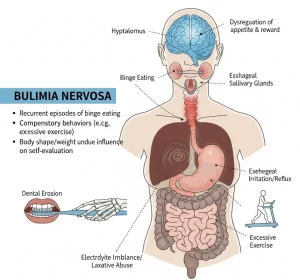Overview
Bulimia (Bulimia Nervosa) – Diagnosis, Symptoms & Treatment
Bulimia nervosa, commonly known as bulimia, is an eating disorder characterized by recurrent episodes of binge eating followed by purging to control weight. Early diagnosis and treatment are crucial to prevent serious physical and mental health complications.
Symptoms of Bulimia
Bulimia may present with:
-
Episodes of overeating large amounts of food in a short time (binging)
-
Purging behaviors such as vomiting, excessive exercise, or use of laxatives
-
Preoccupation with body image and weight
-
Physical symptoms like dehydration, dental problems, gastrointestinal issues, and electrolyte imbalances
-
Emotional symptoms, including anxiety, depression, or low self-esteem
Diagnosis of Bulimia
A healthcare professional diagnoses bulimia through a combination of:
-
Medical and mental health history: Discussing eating habits, weight control methods, and emotional wellbeing
-
Physical exam: Checking for signs of malnutrition, dehydration, and related health complications
-
Laboratory tests: Blood and urine tests to identify electrolyte imbalances or organ damage
-
Heart evaluation: Electrocardiogram (ECG or EKG) to detect irregular heart rhythms caused by purging
-
Mental health assessment: Evaluating emotional state and body image perception
A bulimia diagnosis usually requires binge-purge episodes at least once a week for three months, though any frequency of bingeing and purging can be dangerous.
Treatment for Bulimia
Treatment typically involves a multidisciplinary approach, including medical care, mental health therapy, and nutrition support.
1. Talk Therapy (Psychotherapy)
Different types of psychotherapy help reduce bulimia symptoms:
-
Enhanced Cognitive Behavioral Therapy (CBT-E): Helps teens and adults develop healthy eating habits and replace negative thoughts with positive beliefs.
-
Family-Based Treatment (FBT): Guides parents in supporting their child’s recovery and regaining control over eating.
-
Dialectical Behavioral Therapy (DBT): Improves emotional regulation, stress tolerance, and interpersonal skills.
2. Medications
-
Antidepressants: Certain SSRIs, particularly fluoxetine (Prozac), are FDA-approved to treat bulimia symptoms and may be more effective when combined with therapy.
3. Nutrition Education
-
Dietitians specialized in eating disorders create meal plans to help manage hunger, cravings, and promote balanced nutrition.
-
Regular eating and avoiding restrictive diets are key to recovery.
4. Hospitalization
-
Most bulimia cases are treated outpatient.
-
Severe complications or medical instability may require hospitalization or intensive day treatment programs.
Challenges in Bulimia Recovery
-
Bulimia can be chronic, with binge-purge cycles returning during stress or emotional challenges.
-
Follow-up care with healthcare providers, therapists, and dietitians is essential to prevent relapse.
-
Learning healthy coping strategies, stress management, and interpersonal skills supports long-term recovery.
Early intervention, professional treatment, and family support significantly improve outcomes for people with bulimia.
Advertisement

